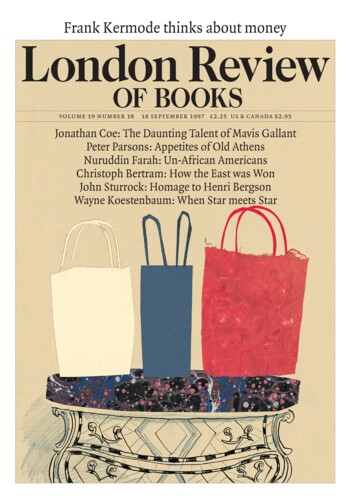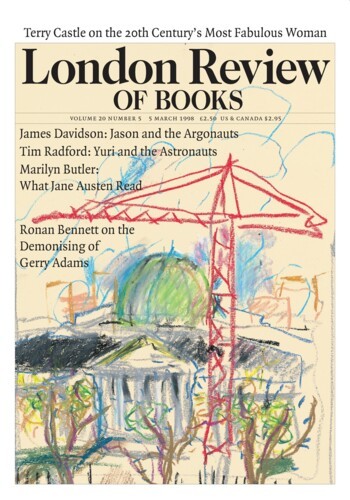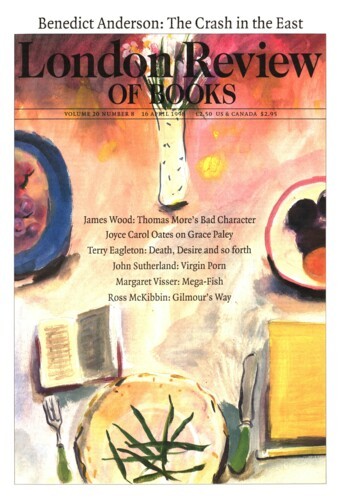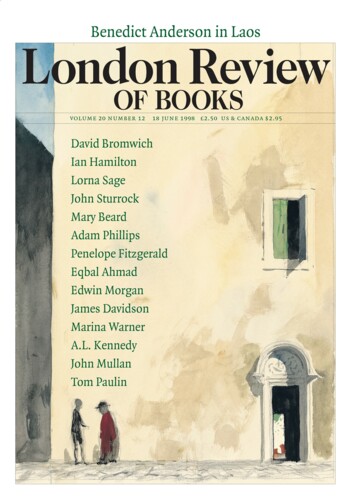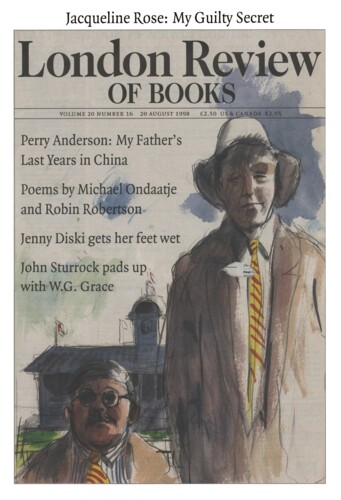James Davidson
James Davidson is a professor of ancient history at the University of Warwick. His first book, Courtesans and Fishcakes: The Consuming Passions of Classical Athens, was published in 1997 and was followed in 2010 by The Greeks and Greek Love: A Radical Reappraisal of Homosexuality in Ancient Greece. His subjects for the LRB have included Bosie, Merce Cunningham, Greek first names, frightening children, Nureyev and Alexander the Great.
Himbo: Apollonios Rhodios
James Davidson, 5 March 1998
The story of Jason sounds like an over-excited pitch to a Hollywood producer, a tale full of sex and violence with a doomed romance at its heart and plenty of opportunity for exotic locations and special FX. A wicked usurper sends his nephew to Colchis on the far side of the Black Sea, a mysterious kingdom in the former Soviet Union famous for its pheasants and autumn crocus. His mission impossible is to steal a golden fleece from under the watchful gaze of a giant snake. He gathers together a band of useful heroes to help him and invents the boat, even persuading Hercules to come aboard the newfangled contraption. Their route is full of hazards: six-armed giants, deadly feather-shooting birds, rocks that crash like cymbals, and women – the man-starved women of Lemnos who milk the Argonauts for sperm like lily-sucking bees, and the water-nymphs who like the look of Hylas, Hercules’ boyfriend, and reach out from beyond his reflection to make sure he is never seen again. By the time they get to Colchis, the Argonauts are in need of a bit of luck, and luckily the King’s daughter, Medea, forms an unsuitable attachment with Jason, betraying her father and her fatherland for the sake of a crush. Jason and his crew are pursued all the way up the Danube and into the Adriatic, but Medea comes to the rescue again, at last finding a use for Apsyrtus, the baby brother with whom she embarked just in case. By the time the Colchians have picked up his pieces, the Argonauts are well away.’
Tuscanini: olives
James Davidson, 16 April 1998
At a party once in Highbury I opened a door, stepping into what I thought might be a bathroom and found myself in an olive grove. Two other guests had found it before me. The smoke from their cigarettes hung around the branches, like an emanation from the leaves. I would have liked to spend some time there, but it was clear I had interrupted a private conversation and the roof was small; a minute or two was the most I could manage of casual lingering. I said something about how warm it was and went back inside.
Tall and Tanned and Young and Lovely: The naked body in Ancient Greece
James Davidson, 18 June 1998
‘If you saw him naked, you would forget about his face,’ Chaerephon mutters in Socrates’ ear. His cousin Charmides had entered the gymnasium, his beauty causing turmoil and consternation. Socrates astonished even himself: he was used to finding young men attractive, but Charmides was something else. Even the youngest boys in the room turned to stare, gazing at him ‘as if he were a statue’.‘
History as a Bunch of Flowers: Jacob Burckhardt
James Davidson, 20 August 1998
Some classicists were, I suspect, completely unaware that the author of The Civilisation of the Renaissance in Italy had written anything at all on the Greeks, and many (myself included) knew not much more than that. In the unlikely event that an allusion to his work is used to ambush you at a conference or a seminar, look nonplussed, mutter a sentence or two from which only the words ‘bourgeois individualism’, ‘Curiosity Shop’ and ‘Spirit of the Age!’ can be clearly heard and move on to the next question. In the unlikely event that the questioner asks you to speak up, simply repeat the procedure, adding the words ‘Swiss’ and ‘dilettante’; perhaps, if you are feeling energetic, quoting Braudel’s description of his work as ‘aérienne’ and ‘suspendue’.‘
Pieces about James Davidson in the LRB
Homobesottedness: Love in Ancient Greece
Peter Green, 8 May 2008
No one reading James Davidson’s enormous and impassioned book, which barely acknowledges the existence, much less the vast numerical superiority, of Greek heterosexual society, would get...
Eels Tomorrow, but Sprats Today
Peter Parsons, 18 September 1997
‘He made money by selling his country; he went around spending it on prostitutes and fish.’ So Demosthenes vilified a political opponent, as publicly corrupt and privately depraved....
Read anywhere with the London Review of Books app, available now from the App Store for Apple devices, Google Play for Android devices and Amazon for your Kindle Fire.
Sign up to our newsletter
For highlights from the latest issue, our archive and the blog, as well as news, events and exclusive promotions.
